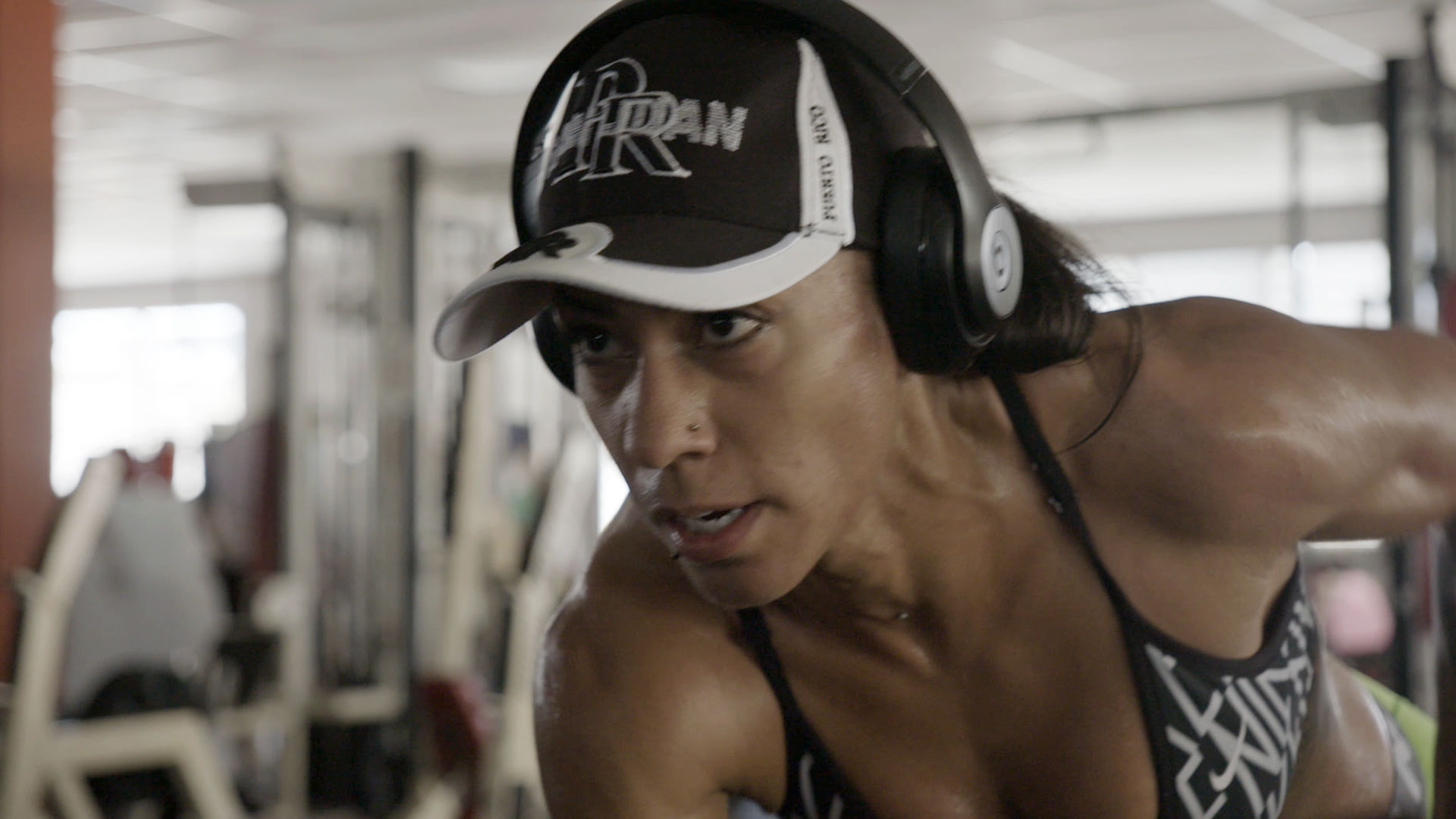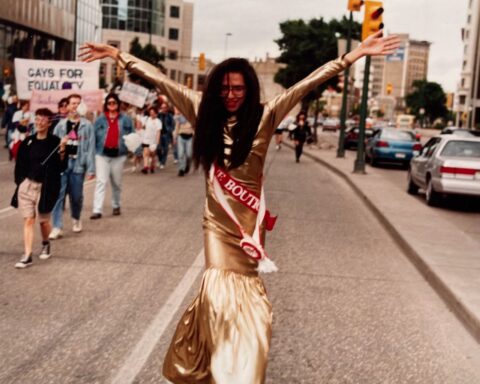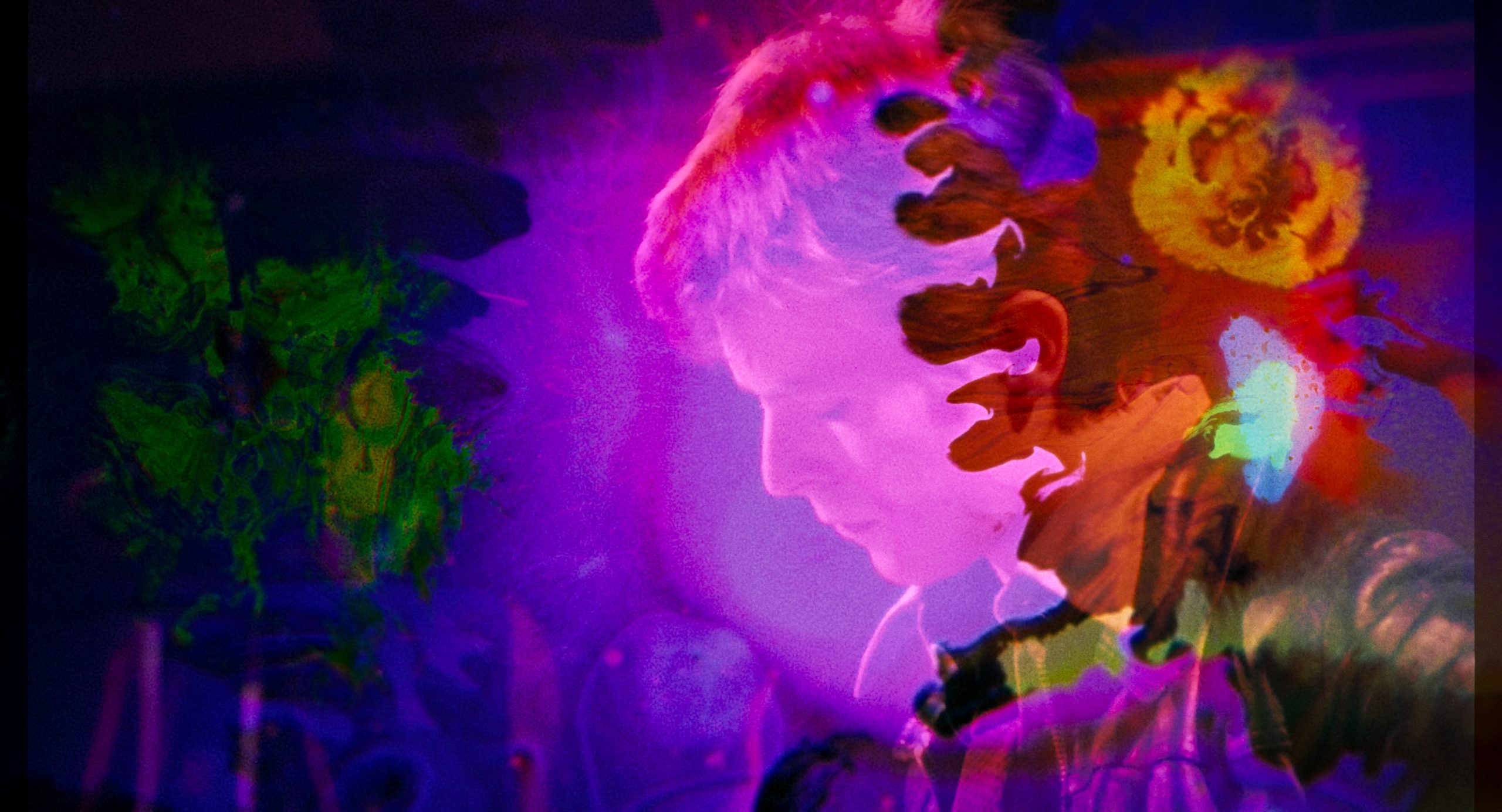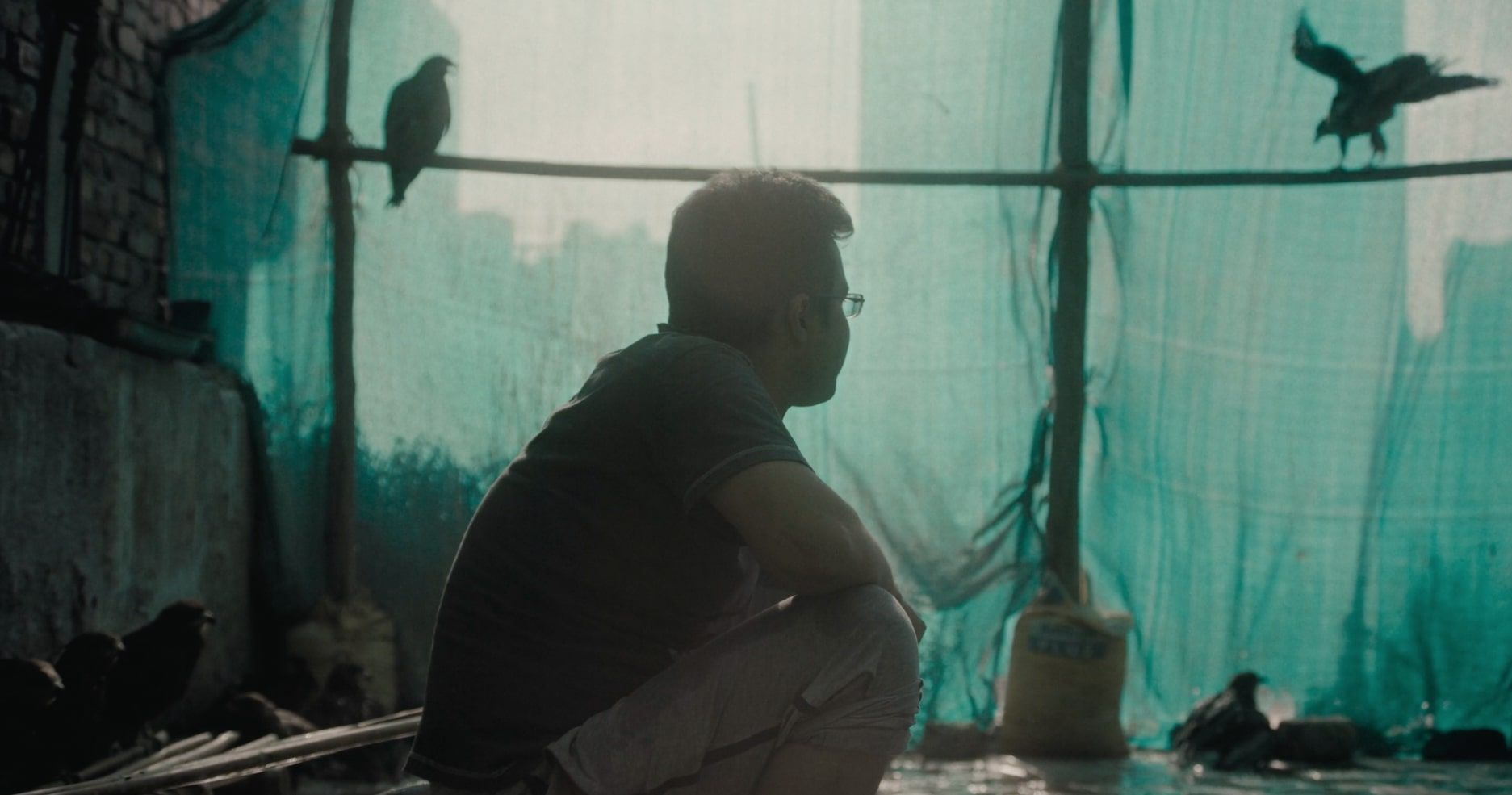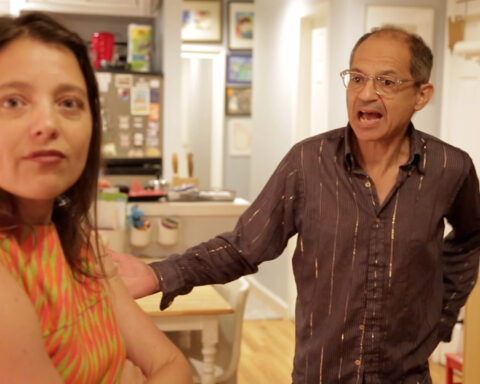“It’s about loving people, not judging people, and allowing yourself to heal,” says Jeannette Feliciano. The subject of the documentary Jeannette, premiering Saturday at Toronto’s Inside Out 2SLGBTQ Film Festival, reflects upon the importance of slowing down and giving oneself time to heal. Feliciano shares her healing journey in this documentary by Maris Curran (Five Nights in Maine). The doc observes how Feliciano regained her strength as one of the survivors of the Pulse Nightclub massacre, which tragically claimed the lives of 49 people and wounded 53 others who simply got together for Latin Night at the Orlando gay bar on June 12, 2016.
Jeannette invites audiences to enter the safe space that Feliciano creates for herself as she rebuilds herself. The journey is equally physical and spiritual as Feliciano dives into a vigorous bodybuilding routine. She lets others harness her strength along the way, particularly her son, Anthony, who plays a pivotal role in her ability to find her balance.
Speaking with POV the morning of May 24, Feliciano talked warmly and passionately about her family’s significance in the healing process. Hours later, though, America would be rocked by yet another senseless act of violence that claimed the lives of 19 children and two teachers at a Texas school. Feliciano’s words about the love she drew from her son, and finding strength by making him feel safe, assumed new significance for this critic while transcribing them the next day. The film invites audiences to see their hardships in Feliciano’s story and draw from the love, strength, and support they see on film. Jeannette is one survivor’s story, but the events of this week are a sad reminder that these stories are all too frequent.

POV: Pat Mullen
JF: Jeannette Feliciano
MC: Maris Curran
This interview has been edited for brevity and clarity.
POV: I understand you were working on another project together and then decided to follow Jeannette for her story. Were you looking more at Jeannette as a character or the event?
MC: The relationship inspired the ideas, and then ended up shaping the film. I was hired to work on a piece about anti-discrimination in the wake of Pulse. Jeannette was already cast when I was brought on. We had a pre-interview call slated and, unfortunately, as happens too much in the U.S, it was the day after another mass shooting. I sent Jeannette a message, saying, “We don’t have to talk about pre-production, but if you still want to have the call to talk, I’m here.” We ended up having a two-hour conversation and it felt like we were able to create space together to actually talk about things that are important to both of us.
That began to blossom once we were together in person. There aren’t enough conversations about the aftermath of trauma. Something like what happened at Pulse is talked about in the present tense and in the immediate aftermath in a very particular angle. I was interested in what happens when the news cameras are gone. After going through something like that, how do you raise a son? How do you leave your house?
POV: What motivated you to participate in this project, Jeannette?
JF: When I met Maris, I needed that relationship building. Never, ever was I thinking about making a movie about Pulse. I think that would be a complete disrespect to myself, to the survivors, and to those who are no longer here. It was important for Maris to open up to me—remember, during that time, I really didn’t even trust anyone. I’m a Puerto Rican woman and we have an American white woman who doesn’t know me and I don’t know her. I had to be like, “What is the angle here?” But when we opened up and we got to know more about each other, and especially knowing that we had similar past, it allowed me to see that this woman is not like me, but at the same time, she is.
When making a film about trauma, it’s important that you’re not re-traumatizing the people you’re working with. One element of that is not asking people to re-perform their trauma through the interview process. – Maris Curran
POV: It seems like you two had many deep conversations, but it’s interesting how the film doesn’t have many interviews—it’s mostly vérité. What guided that principle?
MC: We had many conversations and a series of audio-only interviews. We took our time, cooked for each other, and talked about life. It was a two-sided conversation, less of ‘Maris sits down to interview Jeannette.’ Those conversations form her voice in the film. Jeannette mentioned that she wouldn’t have wanted to do the film if it was a “Pulse film,” if it was about actively putting the audience in the seat of that tragic event. When making a film about trauma, it’s important that you’re not re-traumatizing the people you’re working with. One element of that is not asking people to re-perform their trauma through the interview process. That was the number one guiding principle.
I also work in fiction filmmaking, and I wanted this film to be actively in the present tense of the aftermath period where you feel completely immersed in the intimate experience of the rhythms of her life—her healing, her family, her community. The structure of an interview would really pull you out of that. At the same time, Jeannette’s really tough and we needed a mechanism to break that veneer so that we could get inside of her head and understand what was happening emotionally. That was what we did with the combination of sound design and sparse voiceover.
POV: How was it for you to have that healing process on camera, Jeannette?
JF: I think Maris did it beautifully. She didn’t have a camera in my face. We would just converse. In the film, you see the depression, you see the anxiety, you see the strength, you see the vulnerability. There’s also so much that you see without me saying anything. When I watched the film, I knew exactly what I was feeling at that moment. You don’t necessarily need dialogue to feel and see what is happening on the screen.
I grew up in a tough environment. I was born in Puerto Rico and raised in New York, and it was always about strength. It was never about showing vulnerability. There’s so much beauty in vulnerability and the world needs to see that. There’s really more strength in vulnerability. The film gives people the opportunity to say, “It’s okay for me to cry. It’s okay for me to be vulnerable. It’s okay for me to break down. It’s okay for me to be human.”

POV: What’s the relationship between physical strength and spiritual strength for you? Are you still bodybuilding?
JF: I took to working out at a very young age because I’ve been through a lot of abuse and trauma growing up. Working out was my only outlet. It was my way to get away. My mom never realized that she was such a big inspiration because I used to see when she would work out when I was younger. When it came to the healing, it’s my only way to let go of the weight. If there are days that I want to flip out and curse at the weight, that’s what I do. Ultimately, we go back into this negative world, this constant negativity, and we have to find ways to release. That’s what working out did. I started competing because I’m a natural athlete. I wanted to show women that you can be a pro bikini athlete without taking drugs. I just did the Miss Atlas World this past December, so I am the world’s natural champion. You are talking to Miss Atlas, baby.
MC: Woo hoo!
POV: And Maris, what’s your wellness routine? It was interesting to see this film in the context of COVID and, depending where you, physical activity has been a struggle for many people during lockdowns, but it’s re-emphasized the relationship between physical health and mental health.
MC: My own relationship to exercise is very much connected to mental health. I have a much gentler routine than Jeannette does [laughs] and I was pregnant while cutting this film and during lockdown. I was quite sick while pregnant and that impacted the routine, but I live in Los Angeles, so I hike and do yoga and do run intervals.
POV: Jeannette, what has making this film taught you about motherhood? Your relationship with Anthony is really touching in the film.
JF: I may get a little bit emotional here. My relationship with my son is absolutely amazing. Just a couple weeks ago, he was playing music for me on his keyboard. Every time he plays, I am a ball of tears because I am so proud of him. My relationship with my mother prior to Pulse wasn’t the way it is now. Watching the film, I felt like I was saying in my little girl voice, “You see: mom does love me.” I love being a mother. I’ve learned a lot of what I want to do and don’t want to do from my mom. It’s crazy to think that, as a grown woman, I still yearn for my mom’s love. Can you imagine the masses that still have that of wanting to be loved by their mother or by their families, especially being part of the LGBTQ community. Maris showed that, despite my mom’s beliefs, there’s love there. I needed that.
MC: An unbelievable heart of the film is about motherhood. The question that I set out in asking was how you feel safe again after experiencing something like this. And through her life, Jeannette’s answer was motherhood. It was in making Anthony feel safe. It was learning to lean on her own mother and learning to accept that love. Then there was a wild parallel journey where I was becoming a mother at the same time, which Jeannette and I talk about in our own relationship a lot. It was unexpected for my journey with the film, and, I think, one of the real strengths of the film.
One thing that I’ve come to love is that it’s okay to agree to disagree when it comes to your child’s lifestyle. We’re all entitled to our feelings and I’m able to accept that because my mom still shows love. – Jeannette Feliciano
POV: You also have a unique relationship with your sister Laila, Jeannette, in that not many queer people have the blessing of a sibling who is also gay. How have you been able to share your experiences?
JF: When my sister ended up with Anna—they’ve probably been together for 14 years—I was younger. Prior to that, my sister was married, but my sister was always gay. When she came out when I was younger, oh my gosh—I was so happy, but I was very quiet about it because my mom wasn’t for it. When I finally came out, my sister just lived her life and ended up being with a woman. That was something that she always wanted, but she never opened up to mom about it. For me it was different. I ended up writing my mom a letter at two in the morning after years of holding it in. I wrote her a letter telling her that it’s not her fault. I felt a sense of relief. One thing that I’ve come to love is that it’s okay to agree to disagree when it comes to your child’s lifestyle. We’re all entitled to our feelings and I’m able to accept that because my mom still shows love.
I would probably think very differently if I was rejected by her, but you sense the love regardless of her not approving of the lifestyle. If I was heterosexual and if I was having sex with a man, my mom would have the same mindset. It’s the matter of committing a sin, but the love there is strong. Parents need to see this. If my son was hanging out with a bunch of thugs, and let’s say he robbed a store, I wouldn’t approve of my son’s lifestyle. But I would still love my son. It’s not right to force people to agree on something that they may not want to. What’s important is the respect and love despite it.
POV: I think that really comes through in the film. Has your mom had a chance to see it?
JF: Not yet, but she does want to see it. I have a twin sister, who saw it and loved it. But it was something that I needed to see for myself because my life goes beyond this film. This is pre-Pulse and post-Pulse and post-post. My mom knows our lifestyle. My mom is amazing with how she treats my partner now. She hangs out with her. She drinks with her. She doesn’t treat anybody with any disrespect or any hate. She treats all my friends with a lot of love and respect.
MC: When I went to show Jeannette the film in Orlando, her partner gave me a big hug and said, “I just saw mommy and we were hanging out.” It brought tears to my eyes to hear about the evolution of the relationship beyond the film. Jeannette, I don’t know if you would agree with this, but I also see how much more accepting your mother is now.
JF: Absolutely. When it comes to Jehovah’s Witnesses, their beliefs are about committing a sin. They don’t view gays worse than any individual who is just walking on the street and having sex with heterosexuals. But most importantly, when it comes to that religion, everything is about love. They have to display love without being judgmental.
POV: What do you hope the audience takes away from the strength we see in the film?
JF: I don’t want people to harp on Pulse. I don’t want people to feel as if their traumas are less than what I went through. I want people to see the film and understand that we’re whatever we face in life, according to what we can handle. According to our own traumas, our own trials, our own tribulations, and to continue the fight of healing, but through the healing, remember to love again. A lot of the time, we rush the healing process: we don’t want to be sad. We don’t want to be depressed. You have to allow yourself to go through the process, go through the journey and never look at anybody’s issues as if they’re worse than yours are. When you do, you negate and you take away from your feelings.
MC: We want to create a space for these conversations where people are able to share their experience or see themselves in Jeannette and talk about their own traumas. Whether that be in a public forum, like a screening, or as they’re leaving the cinema, or the next day when they realize they haven’t talked to their mom in x amount of time. That motivates us.
Jeannette screens at Inside Out LGBT Festival on Saturday, May 28 at 2:00pm at TIFF Bell Lightbox.




